Key principles of recycling on-the-go
What’s the problem?
As a nation, we consume more food and drinks ‘on-the-go’ than ever before, with coffees on the commute, a sarnie between meetings or chilled drink with the friends in the park. A nation on-the-go means we get through billions of plastic bottles, cans, glass bottles and coffee cups, many of which end up going to waste despite being recyclable.
With the Deposit Return Scheme continuing to be delayed, recycling on-the-go continues to be important service to help capture the billions of plastics and cans that are not recycled every year.
So why isn’t there more recycling on-the-go?
Not enough bins. Less than half of local authorities currently have on-street recycling systems (WRAP 2019). This means whilst 9 in 10 of people recycle drink packaging at home, only 4 in 10 recycle on-the-go.
Confusion. Half of the public find recycling while out and about confusing (Veolia 2020), leading to high levels of contamination and low collection rates.
Contamination. The wrong materials ending up in the recycling bin often means that the recycling collected ends up being processed as general waste, which can deter further investment in providing this service.
The Solution: #InTheLoop
#InTheLoop is the UK’s biggest collaborative approach to boost recycling on-the-go, which was first trialled in Leeds in 2018, followed by similar trials in Swansea, Edinburgh, Dublin, Wimbledon, Telford and Wrekin and the London borough of Lambeth.
It aims to make it easy for people to recycle drinks materials while out and about - with the ultimate goal of reducing waste by encouraging switching to reusables.
With over fifteen #InTheLoop projects to date, we’ve found a proven solution to increasing recycling when people are out and about, and want to see more towns and cities follow our blueprint.
By testing and refining our approach across the UK, and sharing our results openly, our ambitions is for #InTheLoop be replicated throughout the UK and beyond, creating a consistent and effective approach to recycling on the go.







Bright bins
Make the bins colourful and bright, so they’re easily visible and stand out on busy streets.
Be Specific
People are confused about what to put in the bin and ‘mixed recycling’ gets mixed results. People spend less than 2 seconds at a bin, so be concise and give clear instructions. You’ll reduce contamination by focusing on quality over quantity. If you want empty plastic bottles and cans, say that rather than hazily asking for ‘mixed recycling’.
Bins need buddies
Don’t leave a recycling bin by itself. Place recycling bins next to general waste bins, or use dual bins. Otherwise general waste will end up contaminating your recycling.
Keep it positive and simple
Use positive, encouraging messages in your communications and avoid jargon. Repetition of these simple messages is key – we need to hear something 7 times on average before our behaviour changes.
Build a partnership
Work with local partners to increase the opportunities for people to see and hear about your new campaign. That could be through in-store posters, social media posts, or in-person events to raise awareness of the waste issue and the how to use the new bins.
Measure and make better
Measure what does and doesn’t work through on-the-ground observations, public surveys and waste composition analysis, and refine your approach accordingly. If, for example, you see lots of coffee cups contaminating the recyclate, engage local coffee stores.









